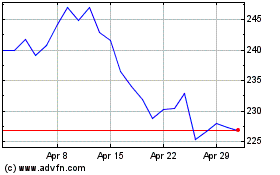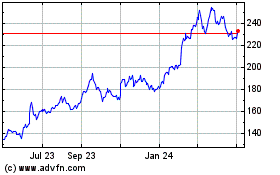General Motors Co., which has been delivering some of the
richest operating profits in its 107-year history, has decided to
do something it hasn't done in nearly a decade: give its veteran
American factory workers a raise.
The No. 1 U.S. auto maker by sales accepted a new four-year wage
agreement with the United Auto Workers union late Sunday, just
ahead of a strike deadline. Details weren't immediately disclosed
but UAW officials called the proposed GM deal "transformative," and
said it promises "long-term significant wage gains" to factory
employees.
If approved, it would be the first time since 2007 that a
Detroit labor contract has been considered transformative. Eight
years ago, GM, Ford Motor Co. and Chrysler trimmed their labor
costs significantly with a new two-tier pay structure and retiree
health-care obligations.
GM then was building as many vehicles at home as it does now,
but losing thousands of dollars on every one. Because of hefty
sales incentives and a practice of dumping unwanted vehicles into
rental fleets, those losses ballooned amid the financial crisis and
rendered the union givebacks as too little, too late.
Today, GM and its Detroit rivals are flourishing amid the
strongest U.S. auto sales in more than a decade and buyers'
appetite for lucrative trucks and sport-utility vehicles. GM last
week reported a record third-quarter North American operating
profit, and said the region's operating margin will exceed 10% of
sales in 2015, rivaling European luxury brands.
Ford on Tuesday reports its latest earnings, and Wall Street
expects similarly rich results.
It is unclear how much the proposed contract for its more than
52,000 U.S. union employees will cost GM, but any increase is a
step away from its initial plan for the negotiations. Earlier this
year, people close to GM's negotiating strategy said bonus payouts
of nearly $40,000 over the past four-year deal represented a
successful variable-pay equation that the auto maker needed to
maintain and potentially sweeten.
Those payouts, costing about $1 billion over the period, were
worth an extra $5.30 an hour but weren't guaranteed.
When senior UAW workers noted it had been a long time since they
saw an hourly rate increase, auto executives pointed to the bonuses
as evidence to that profit-sharing was a better deal.
The Detroit Three have added tens of thousands of jobs combined
over the life of their last contracts. As hiring rose, executives
credited the U.S. industry's leaner costs.
At its peak over the past 10 years, GM built more than 4 million
vehicles in North America, a number that fell below 2 million in
2009, leading to unsustainable cash outflows due to excess
capacity.
GM lost $7,360 a car in 2009. Through September, it made $3,784
a car this year, the most in recent history.
For GM, Mexico offers an attractive alternative to U.S. plants
as it girds for an eventual downturn and U.S. market share at 17%,
more than six percentage points lower than in 2007. Not only does
Mexico have trade deals with most other nations, labor costs are
between $1,000 and $1,300 a car lower than in the U.S., according
to people familiar with the Detroit Three's finances, due mainly to
auto factories' $7.50-an-hour pay.
GM's U.S. wage tab of $58 an hour, including benefits, is 20%
lower than the 2007 figure, but still the richest in the industry
and 20% higher than at Toyota Motor Corp., according to the Center
for Auto Research. Even Ford, which unlike GM avoided bankruptcy in
2009, has a lower hourly rate.
Union workers aren't happy with the industry's two-tier wage
system that was created in 2007. Modified in 2011 so GM and its
rivals hired new workers at about $15.78 an hour and gradually
increased their hourly wage to $19.28, UAW members saw the
structure as unfair and pushed UAW President Dennis Williams to
close the gap and get a raise for all 140,000 factory workers.
Mr. Williams achieved both through a Fiat Chrysler Automobiles
NV wage deal ratified last week. Entry-level workers will graduate
to the top rate over eight years, and more experienced workers will
move to nearly $30 an hour from about $28 an hour.
That deal, which GM was pushed to at least match by the UAW,
will raise Fiat Chrysler's hourly wage costs—including all
benefits—by 12% to nearly $54 an hour from $48, according to people
familiar with the financial details of the contract.
Union workers say that GM and Ford should be more generous given
their greater recent profit margins compared with Fiat
Chrysler.
"Ford and GM are better off financially and they can afford to
pay more," said Scott Shingledecker, a 51-year-old union worker at
GM's truck assembly plant in Flint, Mich. GM workers won't vote on
the proposed contract until at least next week, after the union's
patchwork of local leaders has a chance to review it and pitch it
to workers at coming informational meetings.
GM declined to comment on specifics of its agreement with the
UAW. In a news release issued late Sunday, it said the proposed
wage agreement "is good for employees and the business." That
statement also noted the inclusion of "constructive solutions that
benefit employees and provide flexibility."
Workers at some plants, including the auto maker's small car
factory in Lordstown, Ohio, also want firm production commitments.
Glenn Johnson, president of nearby UAW Local 1112, said employees
are jittery after Ford and Chrysler laid out plans in recent months
to move small car production to Mexico.
"We can have the absolute best agreement in the world," Mr.
Johnson said. "But if we don't have a product, what good is
it?"
Gautham Nagesh contributed to this article.
Write to Christina Rogers at christina.rogers@wsj.com and John
D. Stoll at john.stoll@wsj.com
Access Investor Kit for "Toyota Motor Corp."
Visit
http://www.companyspotlight.com/partner?cp_code=P479&isin=JP3633400001
Access Investor Kit for "Toyota Motor Corp."
Visit
http://www.companyspotlight.com/partner?cp_code=P479&isin=US8923313071
Subscribe to WSJ: http://online.wsj.com?mod=djnwires
(END) Dow Jones Newswires
October 26, 2015 21:25 ET (01:25 GMT)
Copyright (c) 2015 Dow Jones & Company, Inc.
Toyota Motor (NYSE:TM)
Historical Stock Chart
From Oct 2024 to Nov 2024

Toyota Motor (NYSE:TM)
Historical Stock Chart
From Nov 2023 to Nov 2024
